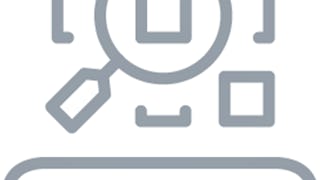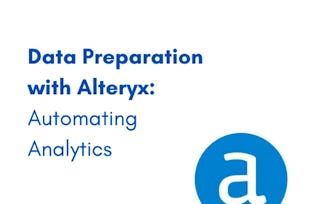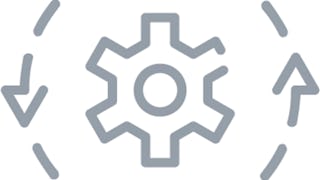Il s'agit du troisième cours du certificat Google Analytique des données. Alors que vous continuez à développer votre compréhension des sujets des deux premiers cours, vous serez introduit à de nouveaux sujets qui vous aideront à acquérir des compétences pratiques en matière d'Analytique des données. Vous apprendrez à utiliser des outils tels que les feuilles de calcul et le langage SQL pour extraire et utiliser les bonnes données pour vos objectifs, et à organiser et protéger vos données. Les analystes de données actuels de Google continueront à vous enseigner et à vous fournir des moyens pratiques pour accomplir des tâches courantes d'analyse de données avec les meilleurs outils et ressources. Les apprenants qui terminent ce programme de certificat seront équipés pour postuler à des emplois de niveau d'introduction en tant qu'analystes de données. Aucune expérience préalable n'est nécessaire. A la fin de ce cours, les apprenants : - découvriront comment les analystes décident des données à collecter pour l'analyse ; - découvriront les données structurées et non structurées, les types de données et les formats de données ; - découvriront comment identifier les différents types de biais dans les données pour aider à assurer la crédibilité des données ; - apprendront comment les analystes utilisent les tableurs et les logiciels de gestion des données.

Préparer des Données pour l’Exploration

Préparer des Données pour l’Exploration
Ce cours fait partie de Analyse de données Google Certificat Professionnel
Enseigné en Français (doublage IA)

Instructeur : Google Career Certificates
1 065 582 déjà inscrits
Inclus avec
23,063 reviews
Expérience recommandée
Ce que vous apprendrez
Expliquez quels sont les facteurs à prendre en compte lors de la prise de décisions concernant la collecte de données.
Discutez de la différence entre des données biaisées et non biaisées.
Décrire les bases de données en faisant référence à leurs fonctions et à leurs composants.
Décrivez les meilleures pratiques en matière d'organisation des données.
Compétences que vous acquerrez
- Catégorie : Sécurité des données
- Catégorie : Maîtrise des données
- Catégorie : Collecte de données
- Catégorie : Bases de données
- Catégorie : Importation/exportation de données
- Catégorie : Stockage des données
- Catégorie : SQL
- Catégorie : Gestion des métadonnées
- Catégorie : Analyse des Données
- Catégorie : Gestion des données
- Catégorie : Éthique des données
- Catégorie : Google Sheets
- Catégorie : Données non structurées
- Catégorie : Qualité des données
Détails à connaître

Ajouter à votre profil LinkedIn
29 devoirs
Découvrez comment les employés des entreprises prestigieuses maîtrisent des compétences recherchées

Élaborez votre expertise en Analyse des Données
- Apprenez de nouveaux concepts auprès d'experts du secteur
- Acquérez une compréhension de base d'un sujet ou d'un outil
- Développez des compétences professionnelles avec des projets pratiques
- Obtenez un certificat professionnel partageable auprès de Google

Il y a 5 modules dans ce cours
Une quantité massive de données est générée chaque jour. Dans cette partie du cours, vous découvrirez comment ces données sont générées et comment les analystes décident des données à utiliser pour l'analyse. Vous en apprendrez également davantage sur les données structurées et non structurées, les types de données et les formats de données alors que vous commencez à réfléchir à la façon de préparer vos données pour l'analyse.
Inclus
9 vidéos10 lectures6 devoirs1 plugin
Avant de travailler avec des données, vous devez vous assurer qu'elles sont impartiales et crédibles. Après tout, si vous débutez votre analyse avec des données non fiables, vous ne pourrez pas vous fier à vos résultats. Dans cette partie du cours, vous apprendrez à identifier les biais des données et à vous assurer que vos données sont crédibles. Vous explorerez également les données ouvertes et l'importance de l'éthique des données et de la confidentialité des données.
Inclus
12 vidéos4 lectures6 devoirs
Lorsque vous analysez de grands ensembles de données, vous accédez à la plupart des données à partir d'une base de données. Dans cette partie du cours, vous découvrirez les bases de données, notamment comment y accéder et extraire, filtrer et trier les données qu'elles contiennent. Vous explorerez également les métadonnées pour découvrir leurs nombreuses facettes et la façon dont les analystes les utilisent pour mieux comprendre leurs données.
Inclus
10 vidéos13 lectures12 devoirs
De bonnes compétences organisationnelles sont une grande partie de la plupart des types de travail, en particulier l'Analytique des données. Dans cette partie du cours, vous apprendrez les meilleures pratiques pour organiser les données et les garder en sécurité. Vous comprendrez également comment les analystes utilisent les conventions de nommage des fichiers pour les aider à organiser leur travail.
Inclus
3 vidéos3 lectures4 devoirs1 plugin
Avoir une forte présence en ligne peut être d'une grande aide pour les demandeurs d'emploi de toutes sortes. Dans cette partie du cours, vous explorerez comment gérer votre présence en ligne. Vous découvrirez également les avantages de la gestion de réseaux avec d'autres professionnels de l'Analytique des données.
Inclus
2 vidéos4 lectures1 devoir
Obtenez un certificat professionnel
Ajoutez ce titre à votre profil LinkedIn, à votre curriculum vitae ou à votre CV. Partagez-le sur les médias sociaux et dans votre évaluation des performances.
Instructeur

Offert par
En savoir plus sur Analyse des Données
 Statut : Essai gratuit
Statut : Essai gratuit Statut : Gratuit
Statut : Gratuit Statut : Essai gratuit
Statut : Essai gratuit Statut : Essai gratuit
Statut : Essai gratuit
Pour quelles raisons les étudiants sur Coursera nous choisissent-ils pour leur carrière ?

Felipe M.

Jennifer J.

Larry W.

Chaitanya A.
Avis des étudiants
- 5 stars
81,98 %
- 4 stars
14,69 %
- 3 stars
2,37 %
- 2 stars
0,47 %
- 1 star
0,47 %
Affichage de 3 sur 23063
Révisé le 8 août 2023
I love how the course it's not limited to teach about the technical skills of a data analyst professional, but it also helps you discover some soft skills that make you a better human resource.
Révisé le 15 nov. 2023
As a beginner, I really appreciated the ease and pace of the course. The videos were explanatory, the reads weren't over-whelming, and the hands-0n activities were very easy to follow and comprehend.
Révisé le 8 août 2021
As a beginner in SQL and Data analyst world, this course "Prepare Data for exploration" open my eyes and enrich my knowledge. I do really enjoy this course. and Excited to move forward. Thank you :)

Ouvrez de nouvelles portes avec Coursera Plus
Accès illimité à 10,000+ cours de niveau international, projets pratiques et programmes de certification prêts à l'emploi - tous inclus dans votre abonnement.
Faites progresser votre carrière avec un diplôme en ligne
Obtenez un diplôme auprès d’universités de renommée mondiale - 100 % en ligne
Rejoignez plus de 3 400 entreprises mondiales qui ont choisi Coursera pour les affaires
Améliorez les compétences de vos employés pour exceller dans l’économie numérique
Foire Aux Questions
Les données sont un groupe de faits qui peuvent prendre de nombreuses formes différentes, telles que des chiffres, des images, des mots, des vidéos, des observations, et bien plus encore. Nous utilisons et créons des données tous les jours, par exemple lorsque nous diffusons un spectacle ou une chanson en continu ou lorsque nous publions un message sur les réseaux sociaux.
L'Analytique des données est la collecte, la transformation et l'organisation de ces faits pour tirer des conclusions, faire des prédictions et favoriser une prise de décision éclairée.
La quantité de données créées chaque jour est énorme. Chaque fois que vous utilisez votre téléphone, que vous cherchez quelque chose en ligne, que vous écoutez de la musique en continu, que vous faites des achats avec une carte de crédit, que vous publiez sur les médias sociaux ou que vous utilisez le GPS pour cartographier un itinéraire, vous créez des données. Les entreprises doivent continuellement adapter leurs produits, leurs services, leurs outils et leurs stratégies commerciales pour répondre à la demande des consommateurs et réagir aux nouvelles tendances. C'est pourquoi les postes d'analystes de données sont très demandés et rémunérés de manière compétitive.
Les analystes de données donnent un sens aux données et aux chiffres pour aider les entreprises à prendre de meilleures décisions. Ils préparent, traitent, analysent et visualisent les données, découvrant des Motifs et des tendances et répondant à des questions clés en cours de route. Leur travail permet à leur équipe élargie de prendre de meilleures décisions commerciales.
Vous apprendrez l'ensemble des données nécessaires pour devenir un analyste de données junior ou associé dans le certificat Google Données Analytique. Les analystes de données savent comment poser la bonne question ; préparer, traiter et analyser les données pour obtenir des renseignements clés ; partager efficacement leurs conclusions avec les personnes concernées ; et fournir des recommandations fondées sur des données pour une action réfléchie.
Dans le cadre de notre programme de certificat, vous acquerrez ces compétences utiles à l'emploi grâce à un contenu interactif (invitations à la discussion, quiz et activités) en moins de six mois, à raison de moins de 10 heures d'études flexibles par semaine. En cours de route, vous suivrez un programme d'études conçu avec l'aide d'employeurs de premier plan et de leaders du secteur, tels que Tableau, Accenture et Deloitte. Vous aurez même la possibilité de réaliser une étude de cas que vous pourrez présenter à des employeurs potentiels pour mettre en valeur vos nouvelles compétences.
Après avoir obtenu votre diplôme, vous aurez accès à des ressources professionnelles et serez mis en relation directe avec des employeurs qui recrutent pour des postes d'entrée dans le domaine de l'analyse des données.
Plus de questions
Aide financière disponible,

